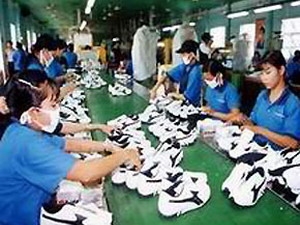VN discontented with EU’s decision
VGP – With 10 yes, 13 no and 4 blank votes, the European Union (EU) on Tuesday accepted the proposal of the European Commission (EC) to extend the imposition of anti-dumping tax on leather-capped shoes imported from Việt Nam and China for 15 months more.
Right
after the vote, the European Footwear Alliance, including such members as
Adidas and Clarks, criticized the EU’s decision, describing that it would cause
losses for European consumers and shows the EU’s trend to pursue protectionism
rather than trade liberalization.

The
Vietnamese footwear industry, which employs mostly women, is being severely hit
by the EC’s anti-dumping decision – Illustration photo
The
duties – 10% on Vietnamese shoes and 16.5% on Chinese shoes – will be
officially applied on January 1, 2010.
The
European Commission’s analysis has shown that European footwear producers have
not shouldered the pressure from imports now. Their market share has been quite
stable during the investigation period (since October 2008) in comparison with
2006.
On
Wednesday, the Vietnamese Ministry of Foreign Affairs and the Ministry of
Industry and Trade opened an international press conference in Hà Nội on the EU’s
decision.
Foreign Ministry
Spokesperson Nguyễn Phương Nga stressed at the conference that Việt Nam is
extremely discontented with the decision.
"This is an unfair and
unreasonable decision which does not soundly reflect actual production and
trading in the products in Việt
And Vietnamese Deputy
Minister of Industry and Trade Lê Danh Vĩnh said that the imposition of
anti-dumping duties on Vietnamese leather-capped shoes is not suitable to the
fine development of the bilateral trade and economic relations between Việt Nam
and the EC, while the country is sparing no efforts to create favorable
conditions for investors, including European ones.
Both
Ms. Nga and Mr. Vĩnh underlined that the tax extension will surely caused
negative impacts on the Vietnamese footwear industry which employs over 650,000
people, mainly poor women.
